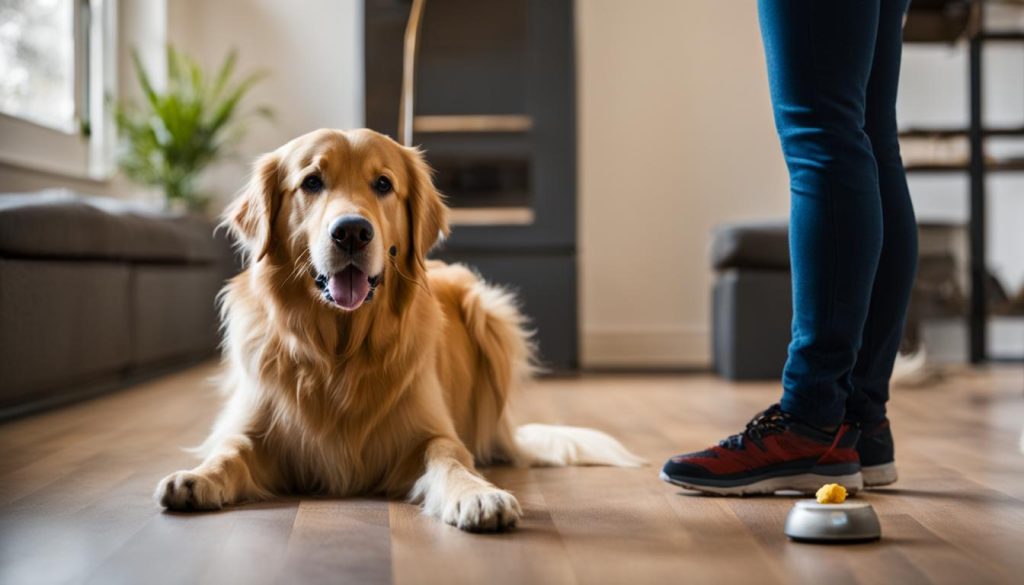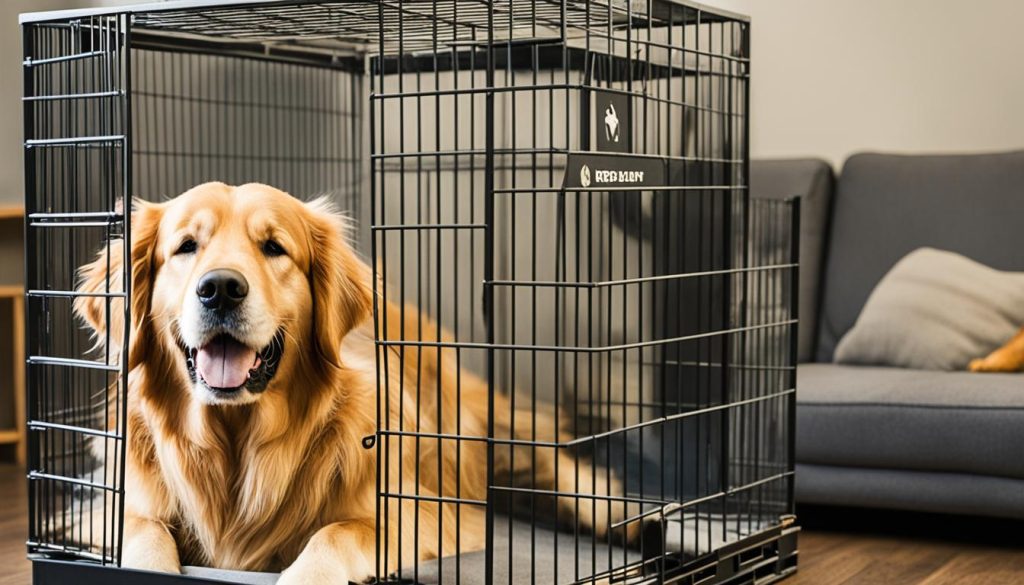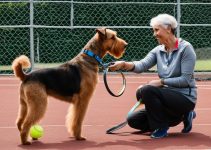When bringing a Golden Retriever puppy into your home, it’s important to be prepared for training. Golden Retrievers are a docile and affectionate breed, but they can develop bad habits if not properly trained. Utilizing positive reinforcement and obedience techniques, you can shape your Golden Retriever into a well-behaved and joyful companion.
Training your Golden Retriever requires patience, consistency, and a deep understanding of their needs. By employing positive reinforcement methods and incorporating obedience techniques, you can create a bond that will last a lifetime. In this article, I will share effective training methods, essential tips, and the importance of family involvement in Golden Retriever training. Let’s start on this exciting journey together and unlock your Golden Retriever’s full potential!
Golden Retriever Training Guide
- Positive reinforcement and obedience techniques are crucial for Golden Retriever training.
- Building a strong bond with your Golden Retriever is essential for successful training.
- Consistency and patience are key when training a Golden Retriever.
- Involving the whole family in training helps your Golden Retriever build positive relationships.
- Keep training sessions fun, interactive, and rewarding for both you and your Golden Retriever.
Golden Retriever Training Methods
When it comes to training your Golden Retriever, there are several effective methods that can help shape their behavior and ensure their overall well-being. Two popular approaches are the Rule of 7 and the Von Falconer Way.
The Rule of 7
The Rule of 7 is a widely recommended training plan that focuses on early exposure to various experiences for your Golden Retriever puppy. This plan involves introducing them to different surfaces, objects, locations, and people.
Exposing your puppy to different surfaces, such as grass, carpet, and tiles, helps them develop confidence and adaptability. Likewise, introducing them to various objects, like toys and household items, stimulates their curiosity and helps prevent destructive behaviors.
By taking your puppy to different locations, such as parks, beaches, and vet clinics, you are teaching them to navigate new environments and socialize with other dogs and people. This exposure plays a vital role in building their confidence and promoting positive social behavior.
Overall, the Rule of 7 encourages early and consistent exposure to new experiences, setting your Golden Retriever on a path to become a well-rounded and confident adult dog.
The Von Falconer Way
The Von Falconer Way is another effective method for Golden Retriever training that focuses on stimulus exposure during key development stages.

Early exposure to stressors, such as loud noises, different sounds, and various environments, can help your puppy develop resilience and adaptability. This method exposes them to controlled situations to build their confidence and train their responses to different stimuli.
Through the Von Falconer Way, you’ll guide your Golden Retriever through carefully designed experiences that promote healthy behavior modification and enhance their obedience skills.
By employing these training methods, you can set a solid foundation for your Golden Retriever’s behavior and ensure their well-rounded development.
Golden Retriever Training Tips
When it comes to training your Golden Retriever, a few key tips can make all the difference. Follow these guidelines to ensure effective and successful training sessions:
1. Exercise Before Training
Before beginning any training session, it’s important to allow your Golden Retriever to burn off excess energy through exercise. A tired dog is more focused and receptive to learning, making the training process smoother and more productive.
2. Consistent Positive Reinforcement
Consistent positive reinforcement is essential for your Golden Retriever’s training. Use rewards, such as treats and praise, to reinforce desired behaviors. This positive association will motivate your dog to repeat those behaviors in the future.
3. Establish a Consistent Routine
Creating a consistent routine is crucial for your Golden Retriever to understand expectations. This routine should include consistent feeding times, regular potty breaks, and dedicated training sessions. By sticking to a predictable schedule, your dog will develop a sense of structure and learn what is expected of them.
4. Utilize Crating
Crating can be a valuable tool in your Golden Retriever’s training journey. A crate provides a safe and comfortable space for your puppy, serving as their den. When used correctly, crating can aid in house training, prevent destructive behaviors, and establish boundaries.

5. Leash Training
Teaching your Golden Retriever leash manners is an important part of their overall training. Start by introducing a leash gradually and use positive reinforcement while practicing walking skills. This will help your dog learn to walk calmly and obediently by your side.
By incorporating these training tips into your routine, you’ll set your Golden Retriever up for success and build a strong bond along the way.
Golden Retriever Training for the Whole Family
Involving the whole family in Golden Retriever training is key to building positive relationships between your dog and every family member. When everyone participates in the training process, it helps create a bond with the dog and ensures consistent reinforcement of the training techniques.
Consistency is crucial when it comes to establishing rules and expectations for your Golden Retriever. By consistently enforcing the same rules throughout the family, your dog will learn what is expected of them and respond accordingly. This consistency will prevent confusion and make the training process more effective.
Listening to your dog’s behaviors is essential for their overall well-being. Pay attention to their body language, vocalizations, and reactions to different situations. By understanding your dog’s needs and respecting their comfort levels, you can create a sense of trust and security, leading to better training outcomes.
Providing your Golden Retriever with plenty of time for exercise and play is crucial. These activities not only provide physical exercise but also mental stimulation. Allowing your dog to run, play, and explore their environment will help them expend their energy in a positive way, reducing the likelihood of them engaging in destructive behaviors.
The Importance of Family Involvement
When every family member participates in the training process, it strengthens the bond between them and the Golden Retriever. It also ensures that the dog receives consistent instructions and commands from everyone, making it easier for them to learn and obey. Involving the whole family in training also helps build a sense of responsibility and ownership among family members, creating a stronger connection with the dog.
Establishing Consistent Rules
Setting consistent rules and expectations is crucial for effective Golden Retriever training. When the dog knows what behavior is acceptable and what is not, they will be more likely to follow the rules. Consistency in enforcing these rules throughout the family helps the dog understand that the same standards apply, regardless of who is giving the command or instruction.
Listening Skills and Empathy
Listening to your dog is an important aspect of effective training. By paying attention to their behaviors and understanding their needs, you can provide the appropriate guidance and help them overcome any challenges they may face during the training process. Empathy and patience are crucial when it comes to training a Golden Retriever, as it helps create a positive and trusting environment.
Providing Freedom for Exercise and Play
Golden Retrievers are active and energetic dogs that require plenty of exercise and mental stimulation. Providing opportunities for your Golden Retriever to engage in physical activities and playtime not only helps them burn off excess energy but also keeps them happy and mentally stimulated. By allowing your dog the freedom to explore and play, you are supporting their overall well-being and contributing to a successful training experience.
Adopting a Trained Golden Retriever
So, you’ve decided to adopt a trained Golden Retriever. Congratulations! However, it’s important to understand that adopting a trained dog doesn’t mean your role as a dog owner is finished. Training should always be continued to reinforce the learned behaviors and commands.
Golden Retrievers have a long lifespan, and ongoing training and reinforcement are necessary to ensure that your furry friend remains well-behaved and socialized. A lifelong commitment to their training and development will contribute to a happy and harmonious relationship with your canine companion.
Continuing training allows your Golden Retriever to stay sharp and responsive to your commands. It reinforces the rules and commands they have already learned, ensuring that they remain obedient and well-mannered in different situations.
Benefits of Continuing Training
- Keeps your dog mentally stimulated
- Strengthens the bond between you and your Golden Retriever
- Prevents the development of bad habits
- Promotes ongoing socialization with other dogs and people
- Allows for introductions to new experiences and environments
By dedicating time for training sessions and providing consistent reinforcement, you are not only investing in your dog’s development but also fostering a deeper connection and understanding with your four-legged companion.
Remember, adopting a trained Golden Retriever is just the beginning of a fulfilling journey. It requires a lifelong commitment to their well-being and growth. Through ongoing training, you can ensure that your Golden Retriever remains well-behaved and continues to bring joy and happiness to your family.
Conclusion
Training your Golden Retriever is a rewarding journey that requires a balanced approach. By combining obedience techniques, positive reinforcement, and a consistent routine, you can shape your Golden Retriever into a well-behaved and happy member of your family. Remember, training is not a one-time task but a lifelong commitment.
Establishing a strong bond with your Golden Retriever is crucial. Spend quality time together, providing love and attention, to build trust and loyalty. Consistency is key, so stick to your training plan and reinforce desired behaviors using positive reinforcement.
Behavior modification plays a vital role in Golden Retriever training. Identify any unwanted behaviors and address them with patience and the right techniques. It’s important to understand that training your Golden Retriever is a gradual process that requires patience and dedication.
By focusing on positive reinforcement and consistent training, you can shape your Golden Retriever into a well-round and happy dog. So embrace the journey of Golden Retriever training, and enjoy the lifelong companionship that follows!
FAQ
What are some tips for training a Golden Retriever?
To train a Golden Retriever, utilize positive reinforcement and obedience techniques such as rewards and praise. Establish a consistent routine for feeding, potty breaks, and training sessions, and consider crate training and leash training.
What is the “Rule of 7” in Golden Retriever training?
The “Rule of 7” is a recommended training plan that involves exposing your Golden Retriever puppy to different surfaces, objects, locations, and people. This helps build their confidence and social behavior.
What is the Von Falconer Way in Golden Retriever training?
The Von Falconer Way focuses on early exposure to stressors during key development stages to help Golden Retriever puppies adapt to various situations. This can improve their confidence, obedience, and social behavior.
Should I let my Golden Retriever exercise before training?
Yes, it’s beneficial to let your Golden Retriever exercise before training to burn off excess energy and help them focus during training sessions.
How important is consistent positive reinforcement in Golden Retriever training?
Consistent positive reinforcement, such as rewards and praise, is key to effective Golden Retriever training. It helps reinforce desired behaviors and encourages your dog to repeat them.
Why is having a consistent routine important in Golden Retriever training?
Establishing a consistent routine for feeding, potty breaks, and training sessions helps your Golden Retriever understand expectations and helps reinforce good behaviors.
Is crate training important for Golden Retrievers?
Yes, crate training can be an essential part of Golden Retriever training. It provides a safe and comfortable space for your puppy and can help with house training and preventing destructive behaviors.
How do I teach my Golden Retriever leash training?
Leash training is important for teaching your Golden Retriever to walk obediently beside you. Using positive reinforcement techniques and gradually introducing them to the leash, you can teach your dog to walk calmly on a leash.
Should the whole family be involved in Golden Retriever training?
Yes, involving the whole family in Golden Retriever training helps the dog build positive relationships with everyone and reinforces consistent rules and expectations.
Why is listening to my Golden Retriever’s behaviors important in training?
Listening to your dog’s behavior and respecting their comfort levels is important for their overall well-being. It helps you understand their needs and allows you to tailor the training approach to them.
Is ongoing training necessary even after adopting a trained Golden Retriever?
Yes, adopting a trained Golden Retriever does not mean your role as a dog owner is finished. Ongoing training and reinforcement are necessary to ensure a well-behaved and socialized companion.
How do I ensure a well-behaved Golden Retriever?
To ensure a well-behaved Golden Retriever, establish a strong bond with your dog, provide ongoing training, and use positive reinforcement techniques. This helps shape their behavior and ensures a happy and well-adjusted pet.
What should I keep in mind when training my Golden Retriever?
When training your Golden Retriever, remember that it is a lifelong commitment that requires love, patience, and dedication. Consistency in training methods and providing plenty of time for exercise and play is key.






